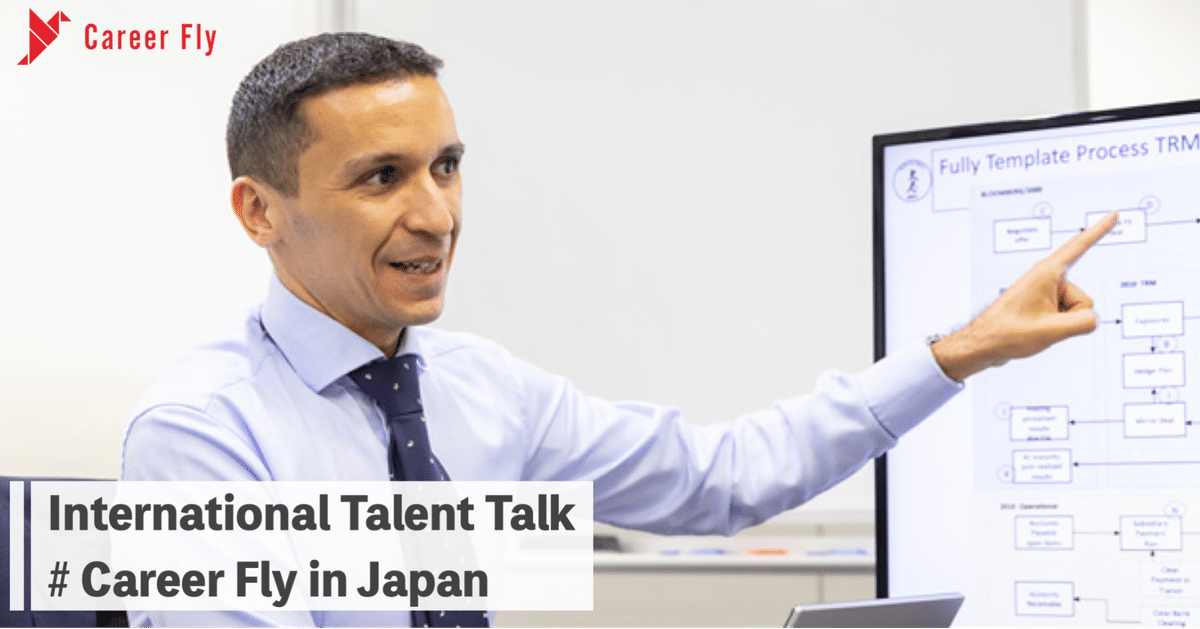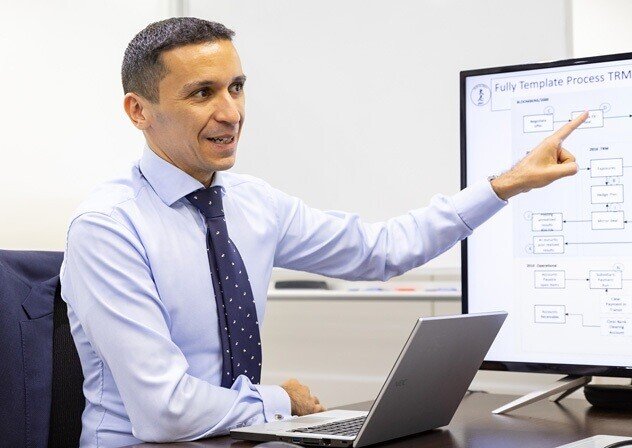
International Talent Talk:What is the most Inspired Career Fly in Japan for an international talent at Multibook
Today, Career Fly focuses on a top SAP consultant in a Japanese SAP consulting company. We will figure out how he achieved his current career and his team. This interview will be read by international talents who are keen to work in Japan and have a dream to be successful in their career here.

Interview with Multibook SAP consulting manager of FM consultation division Mr. Karim Ben Assia
Mr. Karim started his career in UK as a SAP consultant in an international health care company. He came to Japan as a transfer. Later he joined one of the biggest consulting firms and joined Multibook. Now he leads the team with projects and puts his effort toward training junior members.
Tomomi Haniu from CareerFly (Tomomi): Thank you for your time with this interview today. I am glad to get a chance to talk to you finally.
Mr Karim Ben Assia from Multibook (Mr. Karim): Thank you for having me.
Tomomi: Everyone who has interviewed you came back to me and said you were so nice. They all fell in love with you.
Mr. Karim: I am happy to hear that. Most of the foreigners I see in the interviews are quite young. I am approaching my 40s now and I have been through what they are experiencing, so in an interview, I determine whether what they are looking for in their career exists here at Multibook.
Then I also share my advice for building a career in Japan, especially in the IT business.
SAP brought business knowledge to my career
Tomomi: I see. That’s very valuable! So today in this interview, I would like to know what kind of experience you have and what kind of ideas you have towards work. To start, could you tell me your story of what led you to join Multibook?
Mr.Karim: That is a long story. I was born in France. In the middle of my university studies, I moved to the UK. There I completed my master’s degree in digital signal and image processing. I wanted to work in the camera business but it was hard to find such a job in that field due to location issues.
When I considered seeking a job, I used a job search platform through which I happened to meet my first company. That company was a daily necessity product company. In Japan, it is well known as a brand of compression socks.
Thanks to my language skill (French, English and Spanish) and IT background, they assigned me to SAP projects.
SAP brought business-related knowledge, which was very new to me. It’s not only about making the computers talk to each other, but it’s mostly about how the IT solution can help people maximise their work efficiency while making their day-to-day activities more comfortable. So, I thought this was a career I could pursue and I loved it.
After joining some projects in the UK, I transferred to their Japanese office in 2009 and this is how I came to Japan for the first time. Since I always had a keen interest in Asian countries, especially in Japan, it was a good opportunity.
Tomomi: How was your first stay in Japan?
Mr.Karim: It was one of the best years of my life.
Since I was just transferring to the same company in Japan, there was no major hurdle. It was easy in terms of language. I didn’t have to learn a lot of Japanese. Because most of the people in Japan also spoke to me in English. The company itself was nice also. It’s a Japanese office but the culture was pretty much European and the working style fit me well.
The hard part was understanding the unique words and functions in SAP for Japanese business, like 残業代(overtime payment) 、固定資産(fixed assets) etc…
Tomomi: I imagine that was a very comfortable environment.
Why did you switch companies?

Mr.Karim: I didn't want to leave, actually. After a year or so in Japan, I was transferred to Australia, and then to Thailand. But I already loved Japan so much and wanted to go back. At that time, my company was purchased and became part of a bigger corporation. I didn’t feel like working in such a big company, so that was also one of the reasons I decided to leave.
Tomomi: And you got an offer from Deloitte Tomatsu Consulting. How did you meet them?
Mr.Karim: I was job hunting. Through agencies, I had some interviews but since my Japanese was not good enough, I kept being rejected. It was very frustrating. Then Tomatsu came into the picture and hired me.
Tomomi: You were lucky to get such a big opportunity! But was it hard for you to start working in a Japanese company this time?
Mr.Karim: Yes, my Japanese level was about JLPT N4 to N3. It was really not good enough. They hired me because of my SAP skills but there were so much to improve on my side. After getting the offer from Tomatsu, I quickly realized that my Japanese level wasn’t good enough and I needed to catch up fast.” So, I studied Japanese a lot and passed the N2.
The N2 learning process helped me a lot in regards to working in Japan. By the end of my first year at Tomatsu, my Japanese level got good enough, at least for work.

Tomomi: I imagine you had a very hard time. But after that, you joined Multibook, your current company.
How did you encounter this opportunity?
Mr.Karim: After working with Tomatsu for about 3 years, I realized that big companies didn’t fit me well in terms of working style. Also, I wanted to go back to Thailand at the time. I got a chance to meet Mr.Murayama, the CEO of Multibook, and he gave me a chance to open and manage an office in Thailand. So, I moved to Multibook and worked in Thailand for about 3 years. Now, I am back in Japan’s home office and leading the finance team here. I’m happy that the office is still running in Thailand many years after my departure.
We have maintained the same team for 7 years, so hopefully, they are happy with us.
Differences between a SAP consultant in Japan and other countries
Tomomi: Indeed. You worked as a SAP consultant in both Japan and other countries. Are there any differences between the position in Japan and in Europe, for example?
Mr.Karim: The difficult part of being a SAP consultant is that you need to understand both technology and business. I am in the finance domain, so I need to have in depth knowledge in both accounting and IT.
If you understand only one of them, you can still make a career but if you want to reach higher goals, I believe you need these two elements.
In Japan, the expectation I experienced was to be not only a consultant but also an adviser. In depth knowledge of the business processes and rules can be expected. Clients do not always necessarily have the time to explain all the rules of accounting etc. therefore, if a client mentions a certain process such as “monthly invoice” for instance, an experienced consultant should know what this process means so that the requirement analysis can become smoother.
Obviously, it is impossible for one to know everything and clients are usually very keen on teaching you specific requirements.
Furthermore, Clients are not necessarily versed in SAP. In my case, clients are mostly accounting specialists. So, I need to speak his/her language. You have to keep SAP wording as simple as possible and try to express yourself with terms that your counterpart will be familiar with.
At first, it could appear overwhelming, because I am not an accountant, but to be a good consultant, one needs to keep being thirsty for knowledge. I enjoy the high expectations in terms of knowledge because I like learning constantly. Learn everything that you can and stay very open-minded.

Tomomi: You cover very wide project areas! How did you learn the ways of Japan?
Mr.Karim: In Tomatsu, I learned what it meant to be a consultant.
I learned basically 2 things. The importance of Japanese and the work as a consultant.
The work at Tomatsu was fully in Japanese.
Things were very difficult at first because of my poor language abilities, I felt like I didn’t deserve a job there. I felt guilty. But I also realized that this was not only about my Japanese level, but also about the standard of work. To improve your language skills, there is no secret. You just need to study whenever you have time. Use what you learn from work and from Japanese colleagues. In my case, my colleagues at Deloitte were very nice and they helped check my documents or e-mails before sending them to the clients.
The second part is how to be a consultant. One of the most important consultant’s qualities is to be able to analyze a situation/requirement and use appropriate tools to provide a solution that is clear and easy to understand for everyone.
To that purpose, tools like logical thinking, MECE approach (Mutually Exclusive and Collectively Exhaustive), are important.
In a big firm such as DTC, you are not just an SAP consultant but you are a consultant who can be assigned to projects that are not necessarily SAP related. Therefore, becoming versed into project methodology, logical thinking, MECE etc can provide you with a skill set that can make you very versatile and allow you to adapt to other fields.
Tomomi: Tomatsu must have enriched your SAP consultant career! I heard that you need to work a lot when you are in a consulting firm. How was that?
Mr.Karim: Yes, at that time, I was busy. This applies not only to Japan,but consulting firms in general have a busy working style.
Try to make efficient and suitable working style for each consultant
Tomomi: I see. I heard that in Multibook, you have very different working styles. Recently Multibook put “pursue the happiness of employees and their family” in their cooperate philosophy. How is this in your team?
Mr.Karim: I would say this is true. Since our work revolves around clients, sometimes we need to adapt to them. But we try to make sure to work in a way that is in accordance with Multibook’s culture.
I would say there are 2 points to note here. The efficient working style and adaptation to the staff’s personal conditions.
I like the way how Japanese people communicate by trying to reach a consensus. It’s very organized and everybody can be on the same wavelength. However, this could also have adverse effects. You might put too much effort on something that might not be necessary. The other day, I heard 3 status meetings were held for the same project in a single day. The frequency of meetings depends on the size of the project, but three times a day might be an overkill.

At Multibook, the mentality is more pragmatic. As long as the project targets/deadline are met we leave plenty of freedom to our members in terms of working style. Keep meetings frequency and duration at a reasonable level and we try to adopt a rational approach towards decision making.
But never at the expense of quality. One thing that I like most about Japanese work culture is the attention put to details and I believe it is possible to marry both high-quality standards and reasonable timeline/working hours.
Overtime can happen, but if overtime becomes too frequent then I believe something is wrong. In such case, I would talk to my colleagues and figure out if it is due to my poor judgement of the workload or if something can be improved on their end.
Tomomi: I see. How about the adaptation to the staff’s personal conditions?
Mr.Karim: I was directly concerned by it. Multibook proposed to me an office in Thailand. I have seen some other cases also.
We try to make sure that people are happy professionally but also in their private life.
We will always listen and try to make it work so that our employees feel comfortable in both aspects.
It can translate to working remotely or reduced hours for young parents, taking longer annual leaves to visit the family back home, providing assistance in case of unexpected health issues etc.
So yes, it is true. We try to achieve this mission.
Tomomi: I can see that Multibook really cares about their employees and their families.
By the way, as a recruiter, I see many SAP consultants who are thinking of their career and about what kind of companies to join in Japan. Since you have worked for international companies in Japan, including a big consulting firm and a smaller one with a nice working environment, could you give them some ideas of choice?
Mr.Karim: If you can transfer to a Japanese office from another country as an expat, that is a good way to experience working in Japan. In terms of working culture and language, you can stay comfortable.
If you are a junior consultant and want to build a better career in Japan as an SAP consultant, big consulting firms could be a good choice. You can learn what it means to be a SAP consultant in Japan by learning basic skills, such as making presentations, documentations and so on. Also, since they tend to have big projects, even if your Japanese level is not sufficient yet, they can put you into international projects.

It can be tough at first, but would definitely help improve your skills a lot. If you are more experienced, Multibook is a great choice since we have more freedom. Also, as I mentioned, depending on your personal circumstances, we can make arrangements to adjust the working style. I love teaching to junior consultants and we also welcome junior consultants and do our best to make them grow. This is how I would look at the 3 types of companies and who to recommend them to.
Tomomi: I see. You went through all the companies and are now working as a leader at Multibook. You are also an operations officer. How do you think your career will be in the future?
Show your motivation and capability, and people will respect you

Mr.Karim:I would like to help make the team grow. Personally, I don’t really know where my career will take me.
There are multiple choices. First of all, continuing Multibook and taking care of my team, while leading the members and training them. I can also go back to a big company or I can be independent. These 3 options are available to me.
At this moment, I am very happy about the current situation and getting the team to grow.
Tomomi: Thank you for sharing all your stories and ideas about your career. To close this interview, please share some advice & a message for people who want to build their career in Japan.
Mr.Karim: First of all, make sure that you improve your Japanese.
Multibook is an international company in the sense of working with global projects, but its clients are still always Japanese. This is the case for most of consulting companies in Japan. If you find yourself stressed by the language barrier or feeling overwhelmed, just don’t give up and speak to someone who has already experienced the same situation. You may feel like you do not understand the processes or what is expected of you, but it’s quite often connected to the language.
Second of all, don’t be afraid of discrimination.
Discrimination do happen of course and I have experienced quite a fair few myself.
But, in my experience, as long as you show that you are capable and motivated, people will respect you in the work environment.
郷に入っては郷に従え(When in Rome, do as the Romans do.)
Do adapt while keeping your own culture alive.
Tomomi: Thank you so much for the valuable message. I hope you will stay successful in the SAP consulting field with your wonderful team.

Mr.Karim from Multibook ( on the left ) and Tomomi from CareerFly ( on the right)
Career Fly is a hub agency that makes everyone's career fly!
We introduce Stem x Foreign talent x Women to Japanese companies. Currently, our data pool consists of 6000 candidates from 90 different countries.
この記事が気に入ったらサポートをしてみませんか?
